
Spanish Grammar Bank
SPANISH QUESTION WORDS
There are three transversal categories of question words in Spanish: determinants, pronouns and adverbs.
Each category is meant to convey a different grammatical aspect and context, however similar they may seem.
Let’s see how to ask questions in Spanish!

To Get the Right Answers, You Must First Ask the Right Spanish Questions!
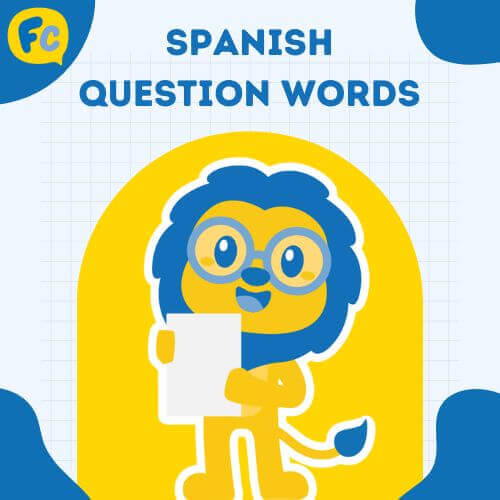
Question words in Spanish are essential for, well, asking questions!
In this blog, we’ll teach you essential vocab and break down the grammar of Spanish questions with lots of examples.
👉 In Spanish, there are three transversal categories of question words:
– determinants, for example: ¿Qué color te gusta? (What color do you like?)
– pronouns, like this one: ¿Quién hay ahí? (Who is there?) and
– adverbs, for instance: ¿Dónde vas? (Where are you going?)
📌 A word of notice: By transversal, we mean that although there are three grammatically separate categories of Spanish question words, some of the same words are actually shared by different categories, which at times may seem to converge.
However, each category is meant to convey a different grammatical aspect and context, however similar they may seem.

✨ Let’s break down ‘How to Ask the Right Question Words‘ ✨
Spanish Question Words || The Grammar Basics
Spanish Question Words || Glossary of Spanish Question Verbs
Spanish Question Words || Determinant Question Words
Spanish Question Words || Pronoun Question Words
Spanish Question Words || Adverb Question Words
Spanish Question Words || Quiz
Spanish Question Words || FAQs
Spanish Question Words || The Grammar Basics
👉 For starters, all (yes, all) Spanish question words carry an accent to distinguish them from their non-interrogative forms, like for example using the word como :
Interrogative form: ¿Cómo te va? (How are you doing?)
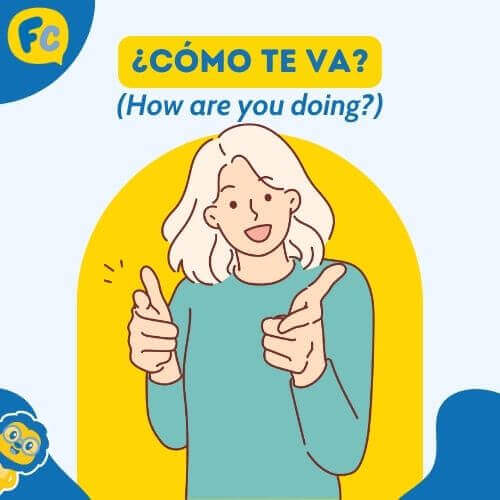
Non-interrogative form: Llueve como nunca. (It’s raining like never before.)
Another main thing to consider when using question words is that they are usually located at the beginning of a phrase. On some occasions though, they can be inserted mid-phrase or at the end of one.
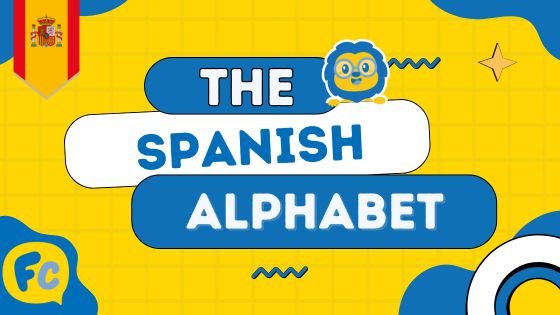
The Spanish Alphabet || From Greek Ancient Times to the 21st Century
🇪🇸 The Spanish Alphabet A World Unto Itself 🌏 📖 The actual term “alphabet” (in Spanish alfabeto ) derives from the Greek word alphabētum But Spanish is a Latin-derived language, right? So what’s up with that? Alfabeto (a…
Spanish Question Words ||
Glossary of Spanish Question Verbs
Here’s a table of common Spanish question words:
| Spanish | English |
|---|---|
| Qué | What |
| Quién | Who |
| Dónde | Where |
| Cuándo | When |
| Por qué | Why |
| Cómo | How |
| Cuánto/a | How much / How many |
| Cuál | Which |
| Question word | Sing/Pl | Gender | Determinant | Pronoun | Adverb |
|---|---|---|---|---|---|
| Cómo (How) | – | – | – | – | ¿Cómo se gestiona? (How to go about this?) |
| Cuál (Which) | sing. | masc./fem. | ¿Cuál has elegido? (Which one did you choose?) | – | – |
| plural | masc./fem. | ¿Cuáles fueron elegidos? (Which ones were chosen?) | |||
| Cuánto/ Cuán (How many/How much) | sing. | masc. | ¿Cuánto queso quieres? (How much cheese do you want?) | – | ¿Cuánto andas a diario? (How much do you walk daily?)¿Cuán arduo es el viaje? (How ardous is the journey?) |
| fem. | ¿Cuánta gente viene? (How many people are coming?) | ||||
| plural | masc. | ¿Cuántos dólares cuesta? (How many dollars does it cost?) | – | ||
| fem. | ¿Cuántas mesas hay? (How many tables are there?) | ||||
| Cuándo (When) | – | – | – | – | ¿Cuándo vuelves? (When are you coming back?) |
| Dónde (Where) | – | – | – | – | ¿Dónde trabajas? (Where do you work?) |
| Qué (What) | sing. | masc./fem. | ¿Qué película ganó el premio? (What movie won the award?) | – | – |
| neutral | – | ¿Qué quiere? (What do you want?) | |||
| plural | masc./fem. | ¿Qué preferencias tienes? (What preferences do you have?) | – | ||
| Qué tal (How is/are) | sing. | masc./fem. | ¿Qué tal tiempo hace? (How is the weather?) | – | ¿Qué tal estás? (How are you?) |
| Quién (Who) | sing. | masc./fem. | – | ¿Quién eres? (Who are you?) | – |
| plural | masc./fem. | ¿Quiénes quieren café? (Who wants coffee?) |
Spanish Question Words ||
Determinant Question Words
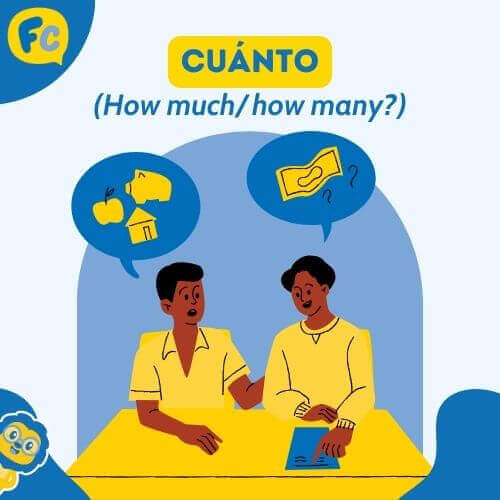
Determinants are words that contain references to and quantifies the subject of a phrase.
So, in the form of a question word, the following are considered to be the Spanish determinants that allow one to construct a question:
cuánto (how many/how much) – this determinant question word varies in gender (cuánto/cuánta) and number (cuántos/cuántas).
👉 So when using this form of question words, remember that they must agree in gender and number with the noun they reference. Some examples:
| Spanish | English |
|---|---|
| ¿Cuánto dinero quieres? | How much money do you want? |
| ¿Cuánta leche has puesto? | How much milk did you put? |
| ¿Cuánto café compraste? | How much coffee did you buy? |
| ¿Cuántas maletas traes? | How many suitcases are you bringing? |
qué (what) – this determinant question word does not vary, irrespective of the gender or number of the subject (qué {niño, niña, niños, niñas}. Qué (what) in the example is used invariably to refer to the subjects boy, girl, boys, girls.)
cuál (which) – this determinant question word varies with regards to the number (cuál/cuáles) but not to the gender (cuál niño – cuál niña).
📌 Note that qué and cuál can be used interchangeably as Spanish question words without any perceptible change to the meaning of the phrase, like in this example:
¿Qué/cuál vestido te gusta? (What/Which dress do you like?)
The use of cuál in the above grammatical context however is more antiquated and if ever common in some Spanish American speaking countries.
Spanish Question Words ||
Pronoun Question Words
👉 The Spanish pronoun question words qué (what), quién (who), cuánto (how much/how many) and cuál (which) likewise allow for the construction of question phrases.
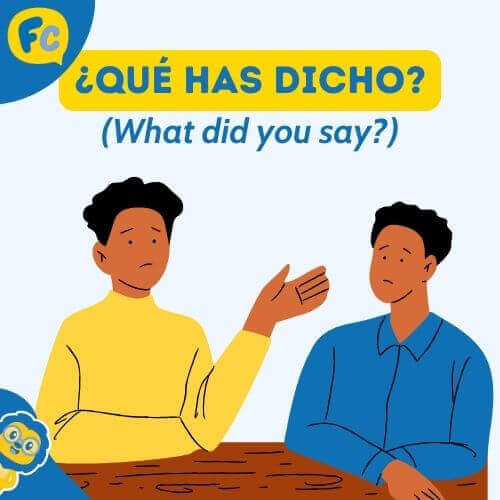
qué (what) as a pronoun question word is used to identify things, to attribute distinctive properties to a being of any nature and to reference dialogue content or to ask about what one did not hear or understand. Some examples:
– to identify things: ¿Qué bebes? (What are you drinking?)
– to attribute distinctive properties: ¿Qué es la fiebre amarilla? (What is the yellow fever?)
– to reference content or to ask for clarifications: ¿Qué pensaría mi hermana si lo supiera? (What would my sister think if she knew?) / ¿Qué has dicho? (What did you say?)
cuál (which) as a pronoun question word is a categorization is still controversial. It is still not clear whether cuál in these contexts is a determinant question word or a pronoun question word.
Either way, below are examples of the use of cuál as a pronoun question word:
Cuál is used to distinguish a person or thing from another, like in the example: ¿Cuál prefieres? (Which one do you prefer?).
Cuál (and not qué) is also used to ask about certain properties and attributes characteristic of something or someone, like in the following examples:
Here’s the text formatted into two columns:
| Spanish | English |
|---|---|
| ¿Cuál es la ciudad más importante de España? | Which is the most important city of Spain? |
| ¿Cuál es su procedencia? | What is its origin? |
cuánto (how many/how much) within this category is considered controversial, so to keep things simple, we will refer to it in the next category of adverb question words.
quién (who), an example being: ¿Quién llamó? (Who called?)
Spanish Question Words ||
Adverb Question Words
👉 Lastly, we have the adverb question words that are used to ask about:
– time (cuándo – when), like for example: ¿Cuándo vendrán mis amigos? (When will my friends come?)
– place (dónde – where – and adónde – where to), some examples:
Here’s the text formatted into two columns:
| Spanish | English |
|---|---|
| ¿Dónde está la estación de tren? | Where is the train station? |
| ¿Adónde vas? | Where to are you going? |
– mode (cómo – how), an example being: ¿Cómo hiciste la reparación? (How did you do the repair?)
– cause (por qué – why), for instance, ¿Por qué lloras? (Why are you crying?)
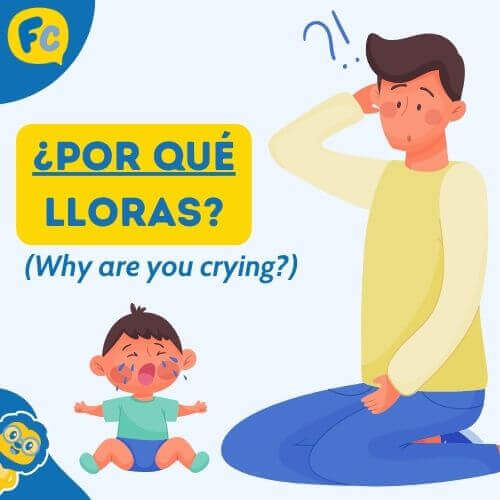
– or quantity (cuánto – how much/how many), an example of which would be: ¿Cuánto duermes? (How long do you sleep?).
💡 A quick tip: To better identify adverb question words, know that from a semantics viewpoint, these question words give way to unknown variables of time, place, mode or quantity.
For example:
¿Cómo viajaste? (How did you travel?)
In the above example, the question begs the answer to the mode of travel one took, so the expected answers should satisfy said unknown variable being asked, like by car, airplane, train, etc.).
📌 A note: Adverb question words can introduce both a direct and an indirect interrogative phrase (question), like for example:
Here’s the text formatted into two columns:
| Spanish | English |
|---|---|
| ¿Cuándo llegarás? | When will you arrive? |
| Yo no sabía adónde ir | I did not know where to go. |
Spanish Question Words || Quiz
Now you’ve mastered ‘Spanish Question Words’, why not check out these Spanish essentials?
👉 The Super Powers of Y in Spanish
🌍 And for a more global challenge, make sure to take a look at Questions Words in Chinese and Question Words in Japanese
Spanish Question Words || FAQs
Is dónde and adónde the same?
Not quite. Although both are adverb question words, dónde (which translates to “where”) is specifically used to ask or refer to a place where something exists or happens, like for example:
¿Dónde he dejado mi bolso? (Where did I leave my bag?)
Adónde on the other hand is equivalent to “where to” and is used to ask or indicate direction or a destination, like for instance:
¿Adónde vamos? (Where are we going to?)
Do you use question marks with an indirect sentence?
While question marks in Spanish are required (both the reverse question mark (¿) at the beginning of a phrase and a regular question mark (?) at the end of a phrase) with direct questions, indirect questions do not require the use of question marks.
For example, the following indirect question (a question embedded within a sentence) does not require said (¿?) punctuation marks:
Quisiera entender qué me estás diciendo. (I would like to understand what you are saying.)
No sé adónde vas. (I do not know where you are going to.)
Note however that when using indirect interrogatives in Spanish, the accent in the question word (like in the above example, adónde) must always be maintained.
Is it ok to use double question marks?
While in English you can repeat question marks at the end of a phrase for emphasis, in Spanish, it is not considered grammatically correct to use double question marks at the end/beginning of a phrase, even if for emphasis.
However, in Spanish and akin to the English repeat question marks, it is acceptable to combine – for the sake of emphasis – a question mark with an exclamation point, like so:
¿¡Qué dices!? (What are you saying??).
Do questions in Spanish start with a question mark?
Yes, direct interrogative phrases (direct questions) in Spanish require a (¿) reverse question mark at the beginning of the phrase and must end with a regular question mark (?).
And why is this? Basically, so that the reader can immediately identify the phrase as a question. It is quite practical if you think of it.
There are some exceptions to the rule, mainly when the phrase is a title and when using rhetorical questions. The accent on the question words though must always be maintained. See examples below:
When used as a title: Cómo Escribir una Novela (How to Write a Novel)
When used as a rhetorical question: Quién te va a cuidar tan bien como tu madre (Who will take care as good care of you as your mother?).
What is the difference between direct and indirect questions in Spanish?
Direct interrogatives in Spanish are independent and standalone questions, like ¿Dónde has aparcado? (Where did you park?).
Indirect interrogatives on the other hand are questions integrated into a sentence, so they are subordinate phrases that are dependent on another verb, like so:
Tengo muchas dudas, no sé qué hacer. (I have many doubts, I don’t know what to do).
Note however that when using indirect interrogatives in Spanish, the accent in the question word must always be maintained.
Want More From LTL?
FANCY LEARNING SPANISH? Check out our online Spanish courses here.
We offer a 7-day free trial to all online students where you can study Spanish 24/7. It doesn’t end there either.
We teach over 10 of the world’s most popular languages 😎
Come and be a part of our amazing community.

Learn Spanish with FlexiClasses
Book online classes with the best teachers in the industry.
MORE FREE LESSONS
-
Sentence structure in Spanish
Subject + Predicate -
Present tense in Spanish
Remove ending -ar/-er/-ir + add conjugated ending -
Simple past tense in Spanish
Remove ending -ar/-er/-ir + add conjugated ending -
Imperfect past in Spanish
Remove ending -ar/-er/-ir + add conjugated ending -
Future tense in Spanish
Remove the ending -ar, -er, -ir + add conjugated conjugation -
Continuous tense in Spanish
Auxiliary verb + verb ending in -ando / -iendo -
Pronouns in Spanish
yo, tú, él/ella, nosotros/as, vosotros/as, ellos/ellas -
Reflexive Pronouns in Spanish
Me, te, se, nos, os -
Genders in Spanish
- -
Plurals in Spanish
los / las + noun + -s, -es, -is -
Prepositions in Spanish
Preposition + Object -
Adjectives in Spanish
Noun + adjectives -
Reflexive verbs in Spanish
Levantar*se* -
Asking questions in Spanish
Qué, Cómo, Quién, Dónde, Cuándo... -
Por or Para || For in Spanish
Por, Para -
With in Spanish
con + noun phrase/subordinate noun clause (person/object) -
Or in Spanish
Noun + y/o + Noun -
This and that in Spanish
Este, esta, estos, estas etc











